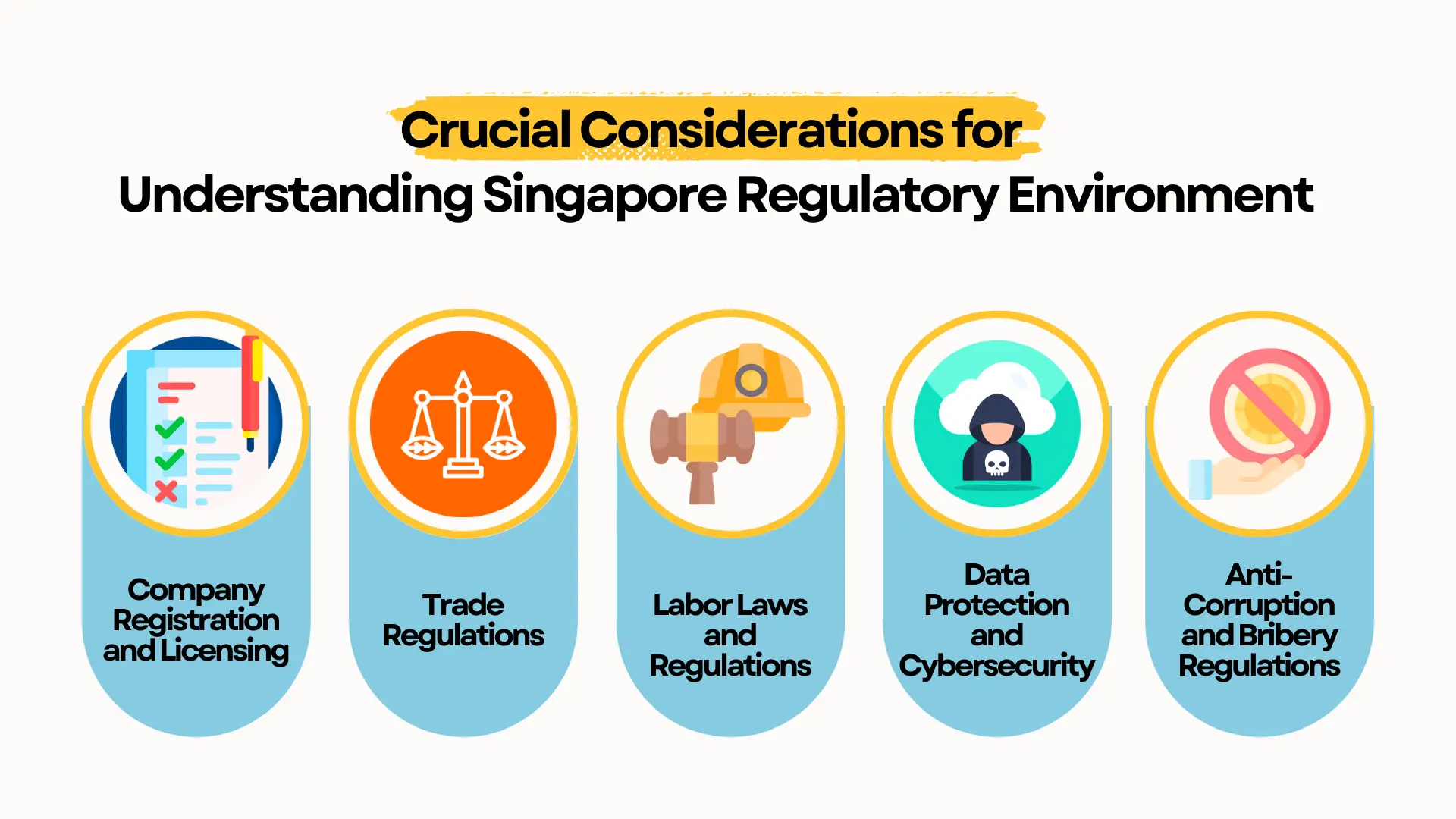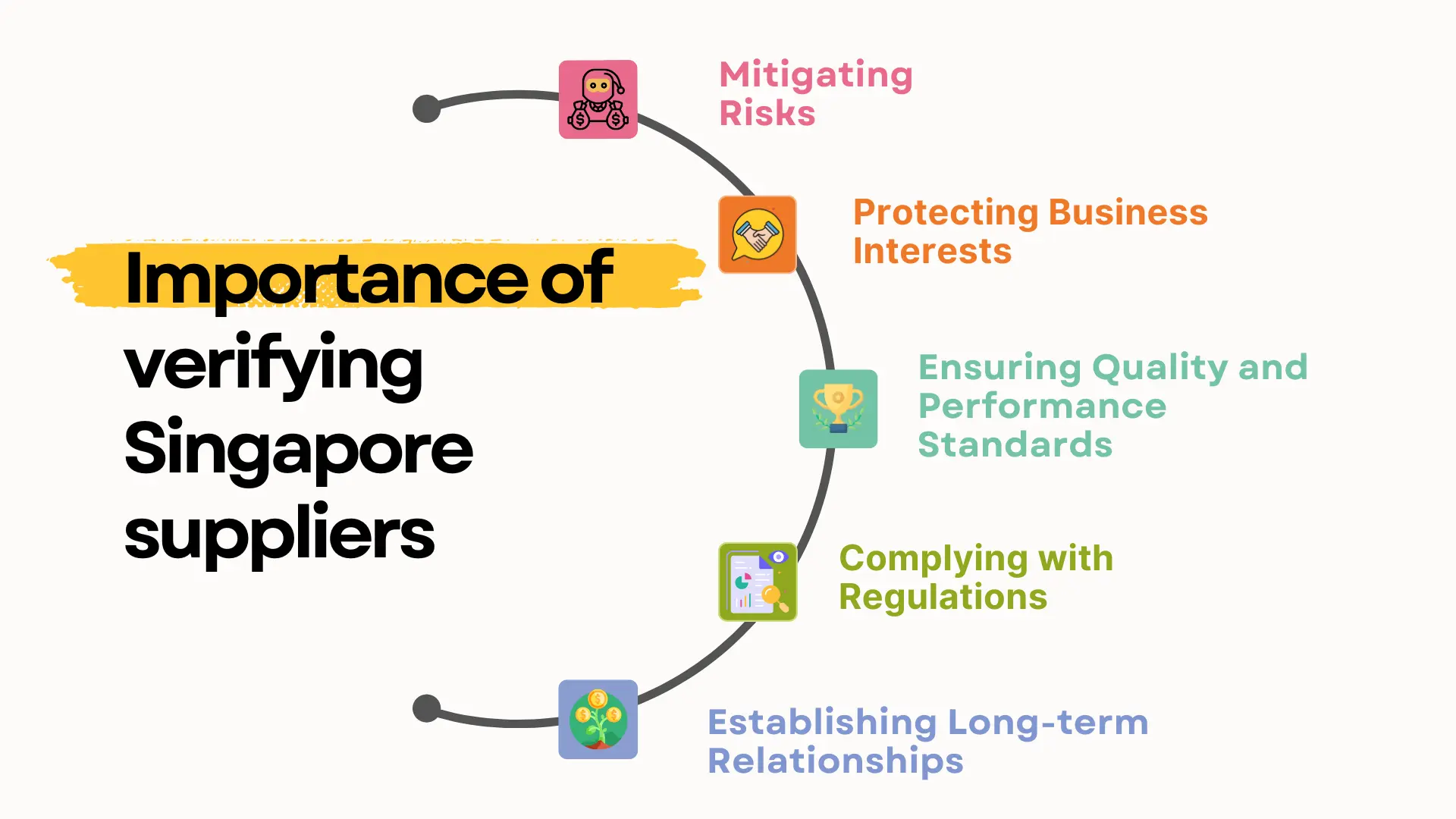An Insider Guide to Singapore Supplier Verification: Ensure compliance for your business

As a hub for international trade and commerce, Singapore is home to many reputable suppliers across various industries. However, not all Singapore suppliers may be trustworthy or reliable, and it is important for businesses to verify the credibility of their suppliers before engaging in business transactions.
In this article, we will provide an insider guide to the verification of Singapore suppliers, including the steps involved and considerations for international companies.

Understanding the Singapore Regulatory Environment
It is critical to have a thorough awareness of the regulatory environment in which Singapore suppliers operate while vetting them. Singapore has a well-regulated corporate environment, with a variety of laws and regulations in place to promote openness, accountability, and fair competition.
When it comes to comprehending the Singapore regulatory environment, here are some crucial considerations:
Company Registration and Licensing:
Singapore companies are required to register with the Accounting and Corporate Regulatory Authority (ACRA) before they can conduct business. This process involves submitting a range of documents, including the Singapore company’s Memorandum and Articles of Association, as well as its business plan and financial projections. In addition to company registration, there may be other licensing requirements that suppliers need to meet, depending on the nature of their business.
Trade Regulations:
Singapore has signed a number of international trade treaties, notably those with the World Trade Organization along with the Association of Southeast Asian Nations. This means that suppliers may be required to follow a variety of trade restrictions when doing business in Singapore, such as customs and import/export procedures. Furthermore, specialized businesses or items, such as food or pharmaceuticals, may be subject to laws.
Labor Laws and Regulations:
Singapore has a well-regulated labor environment, with a variety of rules and regulations in place to protect workers’ rights and promote fair labor practices. These regulations address minimum wage, working hours, and occupational health and safety issues. When vetting Singapore suppliers, it is critical to confirm that they are in compliance with all applicable labor laws and regulations.
Data Protection and Cybersecurity:
Data protection and cybersecurity have become increasingly crucial topics of policy in Singapore as businesses rely more on digital technologies. The Personal Data Protection Act (PDPA) is one important piece of legislation that providers may be required to follow because it establishes standards for the acquisition, use, and disclosure of personal data. Furthermore, the Cybersecurity Act and other legislation provide obligations for data security and cyber threat defense.
Anti-Corruption and Bribery Regulations:
Singapore has a robust anti-corruption and bribery regulatory environment. The Prevention of Corruption Act and the Corrupt Practices Investigation Bureau (CPIB) are the two main authorities in charge of enforcing these restrictions. It is critical to ensure that Singapore suppliers are functioning in an ethical and transparent manner and that they are not involved in any corrupt or unethical acts.
Understanding the regulatory environment in Singapore is an essential step when verifying suppliers in the region.
By having a thorough understanding of the regulatory landscape, businesses can ensure that their suppliers are operating in compliance with all relevant laws and regulations and that they are maintaining high standards of transparency and accountability. This can help to mitigate risks and ensure the success of the business transaction.

Importance of Verifying Singapore Suppliers
Here are some reasons why verifying Singapore suppliers is important:
-
Mitigating Risks
Verifying the credibility of Singapore suppliers helps businesses to mitigate risks associated with fraud, non-performance, and other operational or financial risks. This includes ensuring that the supplier is legally registered and has the necessary licenses and permits to conduct business, as well as confirming their financial stability and reputation.
-
Protecting Business Interests
Engaging with an unverified supplier can put a business’s interests and assets at risk. This can include intellectual property rights, confidential information, and financial resources. Verifying the supplier’s credentials and establishing clear contractual agreements can help to protect a business’s interests and prevent disputes or legal issues.
-
Ensuring Quality and Performance Standards
Engaging with a reliable and trustworthy supplier is essential for ensuring quality and performance standards. Verifying the supplier’s history, reputation, and capabilities can help to ensure that they have the necessary resources, expertise, and quality control measures to meet the business’s expectations.
-
Complying with Regulations
International businesses engaging with Singapore suppliers must comply with Singapore’s regulatory environment, which can be complex and strict. Verifying the supplier’s compliance with local regulations can help to ensure that the business is not at risk of violating any laws or regulations.
-
Establishing Long-term Relationships
Verifying the credibility of Singapore suppliers is also important for establishing long-term relationships based on trust and mutual benefit. This can help to foster ongoing collaboration and communication, as well as facilitate innovation and growth.
Conducting Background Checks on Singapore Suppliers
One of the key steps in verifying the credibility of Singapore suppliers is conducting background checks. These checks help businesses to obtain more detailed information about a supplier’s background, legal status, financial stability, and reputation.
Conducting background checks is particularly important for international companies that may not be familiar with Singapore’s business landscape and regulatory environment.
Here are some steps that businesses can take when conducting background checks on Singapore suppliers:
Step 1:
The first step is to verify that a supplier is a legally registered business in Singapore. Businesses can do this by checking the supplier’s registration details with the Accounting and Corporate Regulatory Authority (ACRA), which is Singapore’s national regulator for business entities. This can help to ensure that the supplier is operating legally and has the necessary licenses and permits to conduct business.
Step 2:
Businesses should also check for any legal or regulatory issues that the supplier may have faced in the past. This can include any lawsuits, regulatory fines, or other legal issues that may indicate potential risks. Businesses can check for such information through public records, online searches, and through their own networks and contacts.
Step 3:
It is important to assess the financial stability of the supplier to ensure that they have the capacity to fulfill their obligations. This includes reviewing their financial statements, credit reports, and other financial indicators. Businesses should also consider the supplier’s payment history and their ability to manage cash flow.
Step 4:
A reputation check involves conducting research on the supplier’s history, background, and reputation in the industry. This can include checking online reviews, references, and testimonials from previous customers, as well as contacting other businesses in the industry to obtain their opinion on the supplier’s reliability and reputation.
Step 5:
A site visit can help businesses to verify the supplier’s physical location, equipment, and facilities. This can help to ensure that the supplier has the necessary resources to fulfill their obligations and maintain the necessary quality standards.
In addition to these steps, businesses may also consider using third-party verification services or engaging a local business partner to help them conduct background checks on Singapore suppliers.
Ongoing Monitoring and Review of Singapore Suppliers
While conducting background checks and evaluating the credibility of a Singapore supplier are essential steps in the verification process, ongoing monitoring and review of supplier performance are equally important.
This ensures that the supplier continues to meet the business’s expectations and requirements over time, and helps to mitigate risks that may arise during the course of the business relationship.
Here are some essential factors to keep in mind when it comes to ongoing monitoring and review of Singapore suppliers:
Communication and Reporting
Regular communication and reporting are essential for maintaining a strong and productive relationship with a Singapore supplier. This includes scheduled check-ins, progress updates, and performance reporting to ensure that the supplier is meeting the necessary quality and performance standards.
It is important to establish clear lines of communication and reporting early on in the relationship and to maintain regular and consistent communication throughout the course of the business transaction.
Performance Metrics and Key Performance Indicators (KPIs)
Establishing clear performance metrics and KPIs is another key element of ongoing monitoring and review of Singapore suppliers. This includes specifying the quality standards, delivery timelines, and other relevant measures of success for the business transaction.
It is important to establish performance metrics and KPIs that are realistic and achievable and to regularly review and assess supplier performance based on these metrics.
Performance Reviews and Audits
In addition to regular communication and reporting, it is important to conduct periodic performance reviews and audits to assess supplier performance and identify any areas for improvement.
This can involve conducting site visits, reviewing documentation and records, and other relevant measures. It is important to establish a clear schedule and process for conducting performance reviews and audits and to communicate these expectations to the supplier.
Risk Mitigation and Contingency Planning
Ongoing monitoring and review of Singapore suppliers should also involve risk mitigation and contingency planning. This includes identifying potential risks and developing contingency plans to mitigate these risks in the event that they arise. This can involve establishing backup suppliers, developing crisis management plans, and other relevant measures.
Contractual Renewal and Renegotiation
Finally, ongoing monitoring and review of Singapore suppliers should also involve contractual renewal and renegotiation. This includes regularly reviewing and updating contractual agreements to ensure that they reflect changes in the business relationship or external factors that may impact the transaction.
It is important to establish clear processes and expectations for contractual renewal and renegotiation and to communicate these expectations to the supplier.
Conclusion
Verifying the credibility of Singapore suppliers is essential for businesses looking to engage in business transactions in Singapore. The steps involved in verifying suppliers include checking their registration, conducting a background check, verifying licenses and certifications, contacting references and past clients, and visiting the supplier’s premises.
International companies should consider cultural and language differences, legal differences, and time zone differences when verifying Singapore suppliers. By taking these steps and considerations, businesses can mitigate risks and ensure that their suppliers are reliable and trustworthy.
Frequently Asked Questions
What is a supplier verification form?
A supplier verification form is a document that companies use to gather and validate information about their suppliers. Details such as the supplier’s name and contact information, company registration number, tax identification number, and any pertinent certifications or accreditations are included in this document.
The form’s purpose is to ensure that the provider is authentic, fulfills specific criteria, and can be trusted to supply products or services to the company. As part of a company’s buying process, supplier verification documents may be needed to help mitigate risks and ensure compliance with legal.
What is the FSVP rule?
Under the FSVP rule, importers are required to verify that imported food meets U.S. safety standards. An importer must develop a written program for identifying potential hazards, verifying compliance, and taking corrective action when necessary. There are some exceptions to the rule, but it applies to all food imports.
What is meant by supplier due diligence?
Supplier due diligence is the process by which a company or agency runs checks on behalf of a business to ensure its suppliers are legitimate, credible organizations that are compliant with local regulatory authorities.
Thorough supplier due diligence helps you determine whether you should be doing business with a particular supplier. The process involves screening, verifying, onboarding, and monitoring your partners and their business.
